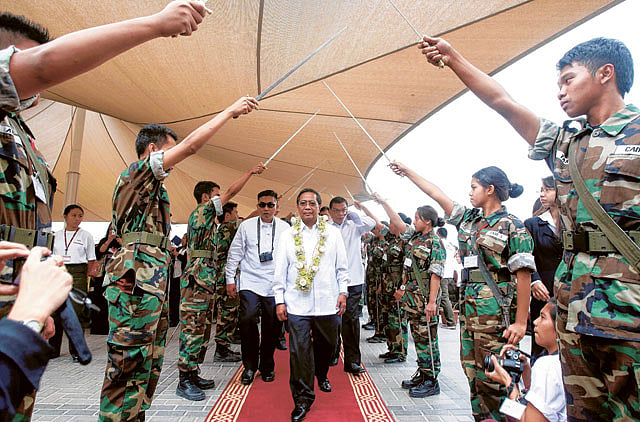Binay to consult public on burial of Marcos' remains
Vice-president to discuss issue with ex-dictator's family

Dubai: Philippine Vice-President Jejomar Binay said he will conduct a public consultation on the issue whether or not to allow the remains of President Ferdinand Marcos to be buried at the Libingan ng mga Bayani (the national heroes cemetery) in Manila.
"When I was instructed to handle it, I was preparing for my trip here so I've been telling those who've been asking me about the issue to get back to me when I return to Manila," Binay told reporters here yesterday evening.
"We'll try to determine the sentiments of the people. We will not be a very divisive nation. It will be a vox populi."
President Benigno Aquino tasked his vice-president to settle the issue which cropped up anew after Marcos' son and namesake, Senator Ferdinand ‘Bongbong' Marcos made the call as the nation marked the 25th anniversary of the People Power revolution in late February.
The 1986 revolution ousted Marcos from office and saw the ascension of Corazon Aquino, the incumbent president's mother, to the presidency.
Renewed calls
The young Marcos renewed the call to give his father a hero's burial after former military chief-of-staff Angelo Reyes was accorded full military honours despite being hounded by corruption charges, which forced him to commit suicide early last month.
In earlier reports, Aquino was quoted saying that he had tasked Binay — a human rights lawyer who defended opposition leaders and anti-government activists during the Marcos regime — to decide on the case.
"I've talked to the vice-president and I asked him if he could be the one to decide on the case. As they say, whatever decision I make, they would readily conclude that I am biased. I talked to him before he went to China," Aquino told reporters in Manila.
Aquino's father and namesake, Benigno ‘Ninoy' Aquino, was a former senator who led the opposition against Marcos. He was being primed to contest the presidency when Marcos declared Martial Law in 1972 and ordered the arrest of all anti-government personalities.
Aquino, who went into exile in the United States, was assassinated when he returned home in 1983.
His death sparked the resurgence of mass actions against the Marcos regime which culminated in the 1986 uprising.
Marcos, who fought as an army officer and guerilla leader in the Second World War, died in 1989 while in exile in Hawaii.
His remains were flown back to his home province in Ilocos Norte in northern Philippines and were placed in a refrigerated glass case within the Marcos family compound in Batac town. Several attempts to bury the late president's remains at the national heroes' cemetery were met with stiff opposition, particularly from victims of human rights violations during his regime.
Binay, who is visiting the UAE, revealed that Ilocos Norte Governor Imee Marcos, the late president's eldest daughter, had dropped hints for them to sit down and discuss the issue.
"I'll meet with them [the Marcos family] anytime upon my return to the Philippines," Binay said.
Sign up for the Daily Briefing
Get the latest news and updates straight to your inbox
Network Links
GN StoreDownload our app
© Al Nisr Publishing LLC 2025. All rights reserved.